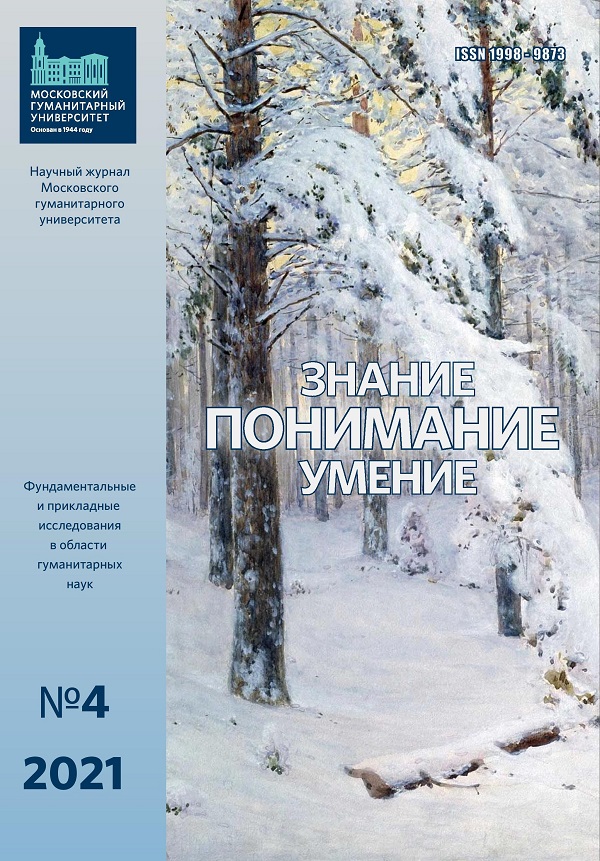Main page / "Knowledge. Understanding. Skill" Journal / Contents / 2014 / No. 4
Pogorskiy E. К. Using Personalisation to Improve the Effectiveness of Global Educational Projects
The paper was supported by grant No. 12-33-01293a2 (project “The Potential of Youth Online Communities: The Formation of Information and Communication Culture of the Person”) from the Russian Foundation for the Humanities.
(University College London, United Kingdom)
Abstract ♦ This paper introduces the role of personalisation in the learning process, with a focus on aspects of the philosophy of technology and internet studies. Significant changes in education, with the spread of the technological capabilities of Open Educational Resources and Massive Open Online Courses, offer the possibility to develop new approaches to solve problems resulting from a limited perception of new knowledge. This makes it possible to increase the effectiveness of learning through the personalisation of educational content which utilises information about participants in the educational process — students, lecturers and managers. In this work we use the concept of a ‘worldview’, which is a key feature of the ‘thesaurus’ approach. Practice of the thesaurus approach to the analysis of data about the participants’ educational projects allows the construction of an individual worldview of each participant in the educational process. Firstly, by utilising a worldview it is increasingly possible to identify potentially interesting topics which are open to the perception of an individual. Secondly, these themes can serve as a background or context through which an individual will be open to new information. Thirdly, following the analysis of a worldview it seems possible to find authorities whose opinion is important to a person and will affect his behaviour. Finally, understanding of a community’s worldview can give insight into the best and most productive combinations in the formation of work groups, learning classes and other human interactions. Shakespeare’s ‘eternal images’ are use to illustrate how this can be done.
Keywords: education, personalization, worldview, MOOC.
Pogorskiy Eduard Konstantinovich, Candidate of Philosophy, PhD, University College London (United Kingdom). Postal address: 26 Bedford way, WC1H 0AP London, UK. Tel.: +44(0)7508002524. E-mail:
pogorsky@yandex.ru
Citation: Pogorskiy, E. К. (2014) Using Personalisation to Improve the Effectiveness of Global Educational Projects. Znanie. Ponimanie. Umenie, no. 4, pp. 334–344. (In Russ.).
Submission date: 30.08.2014.
RUSSIAN VERSION
REFERENCES
Lukov, Val. A. and Lukov, Vl. A. (2008) Tezaurusy: Sub"ektnaia organizatsiia gumanitarnogo znaniia [Thesauri: The Subjective Organization of Humanities Knowledge]. Moscow, The National Institute of Business Publ. 784 p. (In Russ.).
Christakis, N. and Fowler, J. (2013) Social Contagion Theory: Examining Dynamic Social Networks and Human Behaviour. Statistics in Medicine, vol. 32, no. 4, pp. 556–577.
Crystal, D. and Crystal, B. (2002) Shakespeare’s Words: A Glossary and Language Companion. London ; New York, Penguin. xxviii, 650 p.
Humboldt, A. and Sabine, E. (1849) Aspects of Nature, In Different Lands and Different Climates: With Scientific Elucidations : in 2 vols. / by A. Von Humboldt ; translated by Mrs. Sabine. London, Longman, Brown, Green, and Longmans ; J. Murray.
Humboldt, W. and Heath, P. (1988) On Language: The Diversity of Human Language-Structure and Its Influence on the Mental Development of Mankind / W. Von Humboldt ; translated by P. Heath; with an introduction by H. Aarsleff. Cambridge, Cambridge University Press. lxix, 296 p.
Lukov, V. A. (2014) The Conceptualization of Young People in the Twenty-First Century. Russian Social Science Review, vol. 55, no. 1, pp. 58–79.
Sapir, E. (1929) The Status of Linguistics as a Science. Language, vol. 5, no. 4, pp. 207–214.
Weng, L., Flammini, A., Vespignani, A., and Menczer, F. (2012) Competition among Memes in a World with Limited Attention. Scientific Reports, vol. 2, article no. 335.
Whorf, B. (1956) Language, Thought, and Reality : Selected Writings / ed. and with an introd. by J. B. Carroll ; foreword by S. Chase. Cambridge, Technology Press of Massachusetts Institute of Technology ; New York, John Wiley & Sons. xi, 278 p.
|
|
|
 The No. 4 2021 of the
The No. 4 2021 of the
Journal "Knowledge.
Understanding. Skill"
is issued
|
|
|
|